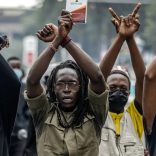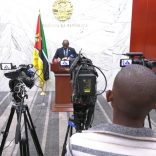South Africa's Vodacom inks internet deal with Starlink
Mozambique Elections: “Our parents demanded justice and were killed; they started the fight and were called vandals” – Forquilha

Screen grab: Miramar
The President of Podemos, Albino Forquilha, held a meeting yesterday with Bernardino Rafael, Commander-General of the Police of the Republic of Mozambique, in which he argued that the popular demonstrations taking place in the country since last week are aimed at getting the institutions that administer justice to carry out work that “dignifies the popular vote”.
Speaking at a press conference afterwards, Forquilha criticised the attitude of the Police in the demonstrations and considered the fight of the young people “just”, even comparing the situation to the Mueda massacre, in 1960, in which the population, when they demanded justice, was slaughtered by the Portuguese colonial administration.
Accompanied by Bernardino Rafael, who at some point ‘became a journalist’, Forquilha argued that the police are not the enemy of the protesters, but should inspire confidence among the protesters and not promote a massacre, as was witnessed in the district of Mecanhelas, in the province of Niassa. In fact, he invited the police to defend the popular vote, as an entity that is part of the administration of justice.
Below are some excerpts from Albino Forquilha’s comments at the joint press conference with the Chief of Police.
“For us, this meeting is quite educational. It shows, in fact, that we are united in our constitutional objectives. It also shows that there is no separation between the police and political parties, from the point of view of the country’s objectives, which is why it is quite educational.
“Podemos does not advocate violence. It is a party that fights for justice and this justice is not only for itself, but for the country as well. The institutions that administer justice, of which the police are a part, are also for justice. During the election campaign, the police supported us very well and were, in fact, defending the justice that was to come in the following days.
“Everything we are doing is to ensure that the institutions that administer justice carry out work that dignifies the vote that the Mozambican people cast in the political parties and this is also the role of the police, to defend that this sovereignty of the people [the vote] is maintained. So, this is the fundamental point. As a party, we made a general challenge to the Constitutional Council, but, as we know, the Constitutional Council is the body that approves rulings that are not subject to appeal. And, perhaps, this is the part that gives Podemos and the police work too. What are we going to do if we expect the Constitutional Council to make its decision, even if it is unfair, which cannot be appealed? What do we do? We are fighting for justice. If the people voted for us, then the institutions that are part of the administration of justice must respect this vote.
“This fight is also to free the police. No one is interested in using violence or attacking the police, but we have to feel that the police in front of us are actually defending the interests of the Constitution itself. We have to feel that and this meeting will perhaps bring us closer to that goal. Therefore, if a situation occurs and if they can accompany us, because the police are the ones who have the state’s weapons, we want to feel safe too. But if what happened in Mecanhelas [Niassa province] happens, for example, where there is a political party on one side and us on the other, and bullets hit our side and we die – I have dozens of deaths and hundreds in prison – protesting unarmed, then perhaps this is not a good thing for the whole process.
“As president of Podemos, I will do everything I can to prevent violence, but I will also understand that we need to fight for this justice. Those who cast their votes know what they did and the results should also be close to reality, but in these elections, 195 seats for one party did not happen. We have to be fair. We hope that the Constitutional Council will do its job and, by doing its job well, help this apparent tension between the police and protesters to subside.
“I was a soldier, I fought and I saw colleagues die, but sometimes I didn’t know the reasons, but there are those who did know the reasons. So, the institutions know the reasons and must do their utmost to bring justice to the people and we stop suffering. We must appeal to the institutions. When we take off our uniforms, we must say that we are citizens and justice must be served. We will appeal to our compatriots throughout the country, we do not want violence, we do not want police officers to die in these conditions or protesters to die, but if we work in coordination, we will be able to identify infiltrators within the process. I must even say that I have suspicions that other political forces are perhaps infiltrating to disorganize our protest process to which we are entitled. But Podemos does not encourage any violence, it encourages the fight for justice. We want the Constitutional Council to take fair and not unfair positions.”
And what about the seven-day protests? -‘journalist’ Bernardino Rafael
“The seven-day protests must be peaceful. But it would also be unfair to tell the Mozambican people that they cannot protest against injustice. It would be violating the Constitution. If we are unhappy, we must protest, but we must not do so violently. In 1960, when the people gathered in Mueda, they wanted justice, they wanted to negotiate so that prices would be fair, but they were killed. So, our parents had to start fighting and were called vandals and terrorists. So, we have to fight for justice. These protests will be peaceful and we will fight so that they are peaceful.”
Should Mozambicans go to work or stay at home? – Bernardino Rafael asked again
“Mozambicans must work, we have to go to work. We do not want the entire economy to stop, but we also do not want to cover up injustices by doing so. If we reflect on injustices, even bad governance, we will die. We have hospitals without medicines, no one looks into that; we have schools without desks. If we look into it, this is a very serious form of violence that kills many people, and we can’t even count them.
“This is a Mozambican fight, it’s a fair fight that we’re fighting to improve things. No one here is against anyone else, the police suffer with us, I know many police stations that don’t even have typewriters, so this fight is also to improve these conditions. These young people’s fight is not just for themselves, but for all of us. So, don’t do things that clash with the Constitution of the Republic because these young people also know how to interpret the Constitution of the Republic.
“Let’s all call for electoral justice to be done. This country cannot be held hostage to the same situation in every election. And this is what gives people courage and they say, as we did in 1964, ‘Independence or death!’ We don’t want that!”












Leave a Reply
Be the First to Comment!
You must be logged in to post a comment.
You must be logged in to post a comment.